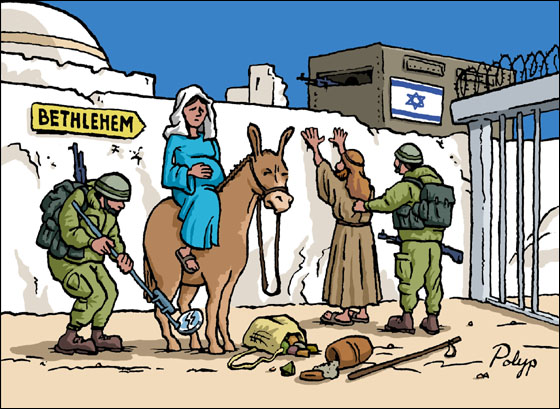
ISABEL KERSHNER reports:
An academic study of the contents of Israeli andPalestinian Authority textbooks, to be published Monday, finds that each side generally presents the other as the enemy, but it undermines recent assertions by the Israeli government thatPalestinian children are educated “to hate.”
Fourteen of the 19 advisory panel members expressed support for the study in a statement on Sunday.
The report was commissioned by the Council of Religious Institutions of the Holy Land, a group of Christian, Jewish and Muslim leaders who advocate for mutual respect and understanding. It was financed by a grant from the United States State Department.
The research was led by two prominent academics with long experience in textbook studies, Daniel Bar-Tal, an Israeli professor of research in child development and education at Tel Aviv University, and Sami Adwan, a Palestinian associate professor of education at Bethlehem University.
The project was originated by Dr. Bruce E. Wexler, professor emeritus of psychiatry at the Yale School of Medicine, who co-founded an organization to promote Israeli-Palestinian cooperation.
In a response to the Israeli Ministry of Education, the three professors cited the rigorous research methods employed and wrote of their hopes that the ministries on both sides would “be moved to prepare a plan of action” to help “advance the peace building process.”
Dr. Wexler added that all the advisory panel members were familiar with the report’s main findings.
Unimpressed with the quality of previous, more subjective studies, Dr. Wexler said that he had insisted on applying scientific research methods for this one, so as “to provide real facts about a controversial issue.”
This included employing research assistants from both sides who were fluent in Hebrew and Arabic and data entered remotely into a database at Yale, similar to a blind study.
The study examined books from Israel’s state secular and religious systems as well as those used in independent ultra-Orthodox schools, books issued by the Palestinian Authority Ministry of Education and used in the West Bank and Gaza, and a small number used in the few independent Islamic Trust schools. It did not include religious scriptures.
The new study avoids harsh language and couches the bad news in a kind of symmetry.
It found that extreme examples of dehumanization and demonization were “very rare” on both sides. The few examples given included one from an ultra-Orthodox textbook describing an Israeli settlement established on the ruins of an Arab village that “had always been a nest of murderers.” A Palestinian language textbook included a reference to “the slaughterhouse,” explaining it as the nickname prisoners had given to an interrogation center “due to the brutality of the interrogators.”
The report said that both Israeli and Palestinian books provided unilateral national narratives that presented the other side as an enemy and that there was a lack of information about each other’s religions, culture and daily life.
The failure even to mark the existence of the other side on most maps, it said, “serves to deny the legitimate presence of the other.”
But another significant conclusion was that Israeli state textbooks provided more information and less negative characterizations of the other side and more self-criticism regarding certain historical episodes than the ultra-Orthodox or Palestinian books.
Addressing the 1948 massacre in the Arab village of Deir Yassin, for example, a book used in the state secular and religious schools noted that the battle “developed into the killing of dozens of helpless Arabs.”
The study concludes that the maps reinforce each side’s self-narrative and fears — for the Palestinians, that Israel seeks to keep and expand occupied territories, and for the Israelis, that the Arab nations seek to wipe Israel off the map.
The textbook teachings on martyrdom and self-sacrifice are treated with similar evenhandedness. Palestinian sixth graders read in a language book that “every stone is violated, every square cries out in anger, every nerve is abuzz, death before submission, death before submission, forward!”
Israeli second graders are told the story of Joseph Trumpeldor, who died defending an early Zionist settlement from Arab attackers in 1920 and was said to have uttered in his last moments, “Never mind, it is good to die for our country.”




1 comment:
fantastic put up, very informative. I ponder why the other experts of this
sector do not understand this. You must proceed your writing.
I am confident, you've a great readers' base
already!
My homepage - michael kors jewelry collection
Post a Comment